初中英语外研版九年级下册高效课堂资料M12知识点
初中英语外研版九年级下册高效课堂资料M1U2 教学设计(1)
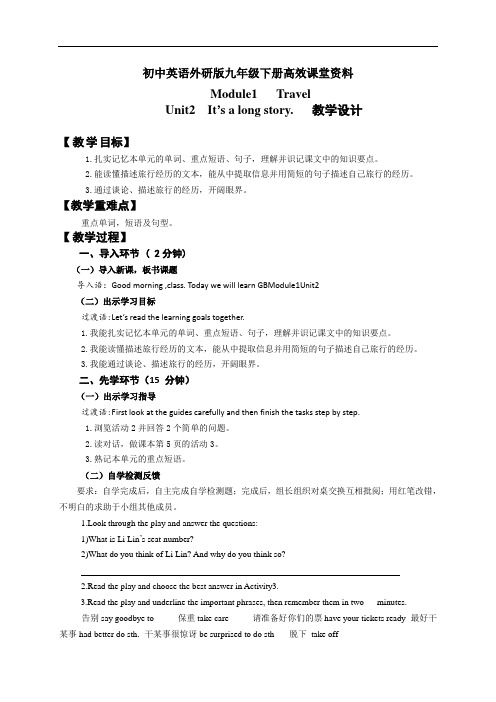
初中英语外研版九年级下册高效课堂资料Module1 TravelUnit2 It’s a long story. 教学设计【教学目标】1.扎实记忆本单元的单词、重点短语、句子,理解并识记课文中的知识要点。
2.能读懂描述旅行经历的文本,能从中提取信息并用简短的句子描述自己旅行的经历。
3.通过谈论、描述旅行的经历,开阔眼界。
【教学重难点】重点单词,短语及句型。
【教学过程】一、导入环节 ( 2分钟)(一)导入新课,板书课题导入语:Good morning ,class. Today we will learn GBModule1Unit2(二)出示学习目标过渡语:Let’s read the learning goals together.1.我能扎实记忆本单元的单词、重点短语、句子,理解并识记课文中的知识要点。
2.我能读懂描述旅行经历的文本,能从中提取信息并用简短的句子描述自己旅行的经历。
3.我能通过谈论、描述旅行的经历,开阔眼界。
二、先学环节(15 分钟)(一)出示学习指导过渡语:First look at the guides carefully and then finish the tasks step by step.1.浏览活动2并回答2个简单的问题。
2.读对话,做课本第5页的活动3。
3.熟记本单元的重点短语。
(二)自学检测反馈要求:自学完成后,自主完成自学检测题;完成后,组长组织对桌交换互相批阅;用红笔改错,不明白的求助于小组其他成员。
1.Look through the play and answer the questions:1)What is Li Lin’s seat number?_________________________________2)What do you think of Li Lin? And why do you think so?2.Read the play and choose the best answer in Activity3.3.Read the play and underline the important phrases, then remember them in two minutes.告别say goodbye to 保重take care 请准备好你们的票have your tickets ready最好干某事had better do sth. 干某事很惊讶be surprised to do sth脱下take off点拨:1 1)Car8,Seat12A 2)He is very good/kind... (第二问是开放性答案)2.bacbcc(三)质疑问难过渡语:Do you have any questions? If you have some questions, put up your hands.三、后教环节(15 分钟)过渡语:After learning the passage,let’s work in groups .要求:先独立完成,再组内交流。
初中英语外研版九年级下册高效课堂资料m2 知识梳理
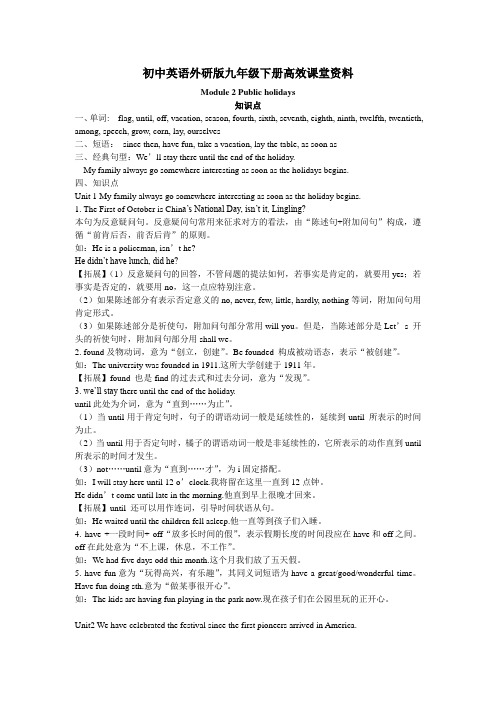
初中英语外研版九年级下册高效课堂资料Module 2 Public holidays知识点一、单词: flag, until, off, vacation, season, fourth, sixth, seventh, eighth, ninth, twelfth, twentieth, among, speech, grow, corn, lay, ourselves二、短语:since then, have fun, take a vacation, lay the table, as soon as三、经典句型:We’ll stay there until the end of the holiday.My family always go somewhere interesting as soon as the holidays begins.四、知识点Unit 1 My family always go somewhere interesting as soon as the holiday begins.1. The First of October is Chin a’s National Day, isn’t it, Lingling?本句为反意疑问句。
反意疑问句常用来征求对方的看法,由“陈述句+附加问句”构成,遵循“前肯后否,前否后肯”的原则。
如:He is a policeman, isn’t he?He didn’t have lunch, did he?【拓展】(1)反意疑问句的回答,不管问题的提法如何,若事实是肯定的,就要用yes;若事实是否定的,就要用no,这一点应特别注意。
(2)如果陈述部分有表示否定意义的no, never, few, little, hardly, nothing等词,附加问句用肯定形式。
(3)如果陈述部分是祈使句,附加问句部分常用will you。
外研版九年级下册Module 12知识点整理
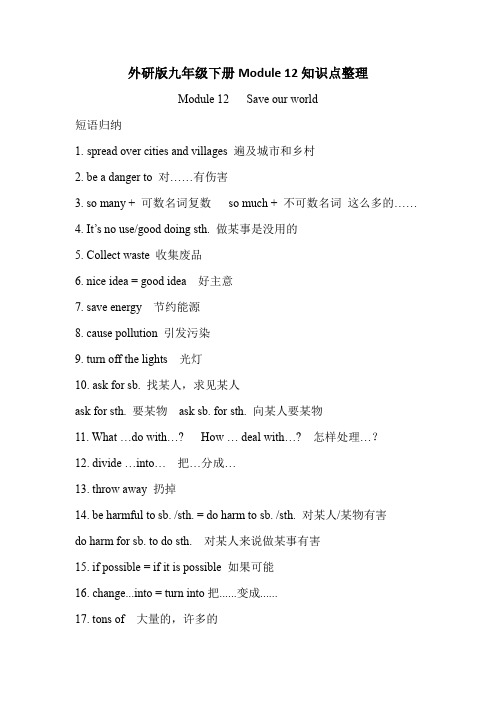
外研版九年级下册Module 12知识点整理Module 12 Save our world短语归纳1.spread over cities and villages 遍及城市和乡村2. be a danger to 对……有伤害3. so many + 可数名词复数so much + 不可数名词这么多的……4. It’s no use/good doing sth. 做某事是没用的5. Collect waste 收集废品6. nice idea = good idea 好主意7. save energy 节约能源8. cause pollution 引发污染9. turn off the lights 光灯10. ask for sb. 找某人,求见某人ask for sth. 要某物ask sb. for sth. 向某人要某物11. What …do with…? How … deal with…? 怎样处理…?12. d ivide …into… 把…分成…13. throw away 扔掉14. be harmful to sb. /sth. = do harm to sb. /sth. 对某人/某物有害do harm for sb. to do sth. 对某人来说做某事有害15. if possible = if it is possible 如果可能16. change...into = turn into把......变成......17. tons of 大量的,许多的18. make a change 作出改变19. hope for sth. 期待/盼望某事20. take steps to do sth. 采取措施做某事21. Make a policy for 为……制政策22. try one’s best to do sth. 尽某人最大努力做某事23. protect the environment 保护环境24. Plant trees 种树,植树25. clean up 打扫,清理26. such a short time 这么短的时间用法集萃1.so much+不可数名词那么多2. It’s no use doing sth. 做某事是没有用的3. What...do with...?.......怎样处理......?4. If possible如果可能。
初中英语外研版九年级下册高效课堂资料M12知识点.docx
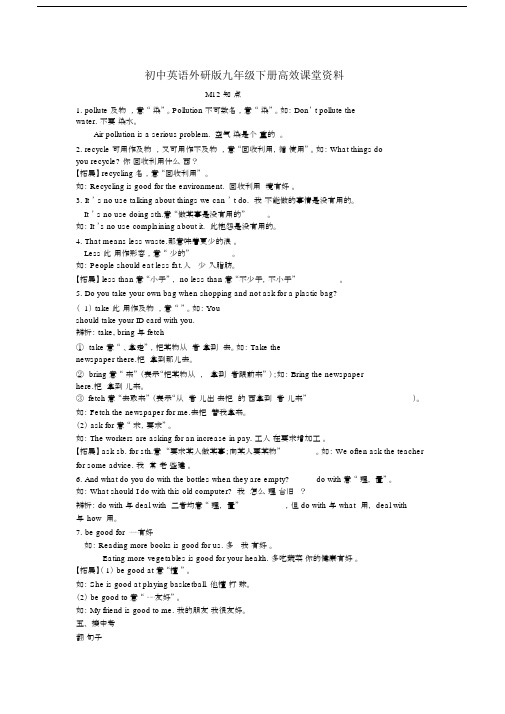
初中英语外研版九年级下册高效课堂资料M12 知点1.pollute 及物,意“ 染”。
Pollution 不可数名,意“ 染”。
如: Don’ t pollute thewater. 不要染水。
Air pollution is a serious problem. 空气染是个重的。
2.recycle 可用作及物,又可用作不及物,意“回收利用,循使用”。
如: What things doyou recycle? 你回收利用什么西?【拓展】 recycling 名,意“回收利用”。
如: Recycling is good for the environment. 回收利用境有好。
3.It ’ s no use talking about things we can ’ t do.我不能做的事情是没有用的。
It ’ s no use doing sth.意“做某事是没有用的”。
如: It ’s no use complaining about it. 此抱怨是没有用的。
4. That means less waste.那意味着更少的浪。
Less 此用作形容,意“ 少的”。
如: People should eat less fat.人少入脂肪。
【拓展】 less than 意“小于” , no less than 意“不少于,不小于”。
5. Do you take your own bag when shopping and not ask for a plastic bag?(1) take 此用作及物,意“ ”。
如: Youshould take your ID card with you.辨析: take, bring 与 fetch①take 意“ 、拿走” ,把某物从者拿到去。
如: Take thenewspaper there.把拿到那儿去。
②bring 意“ 来” (表示“把某物从,拿到者跟前来” );如: Bring the newspaperhere.把拿到儿来。
初中英语外研版九年级下册高效课堂资料M1-M2复习教学设计

(二)自学检测反馈
发生事故have an accident最好had better
赶上catch up等待wait for
约定have an agreement遇到happen to
7. I _______(think) we had an ________(agree)______(stay)together .
8. Try to list the key structures and expressions and more __________(important) note any occasions where you had difficulty in _______(learn).
学生能对自学中的内容有深度的思考。
三、
后
教
环
节
(15分钟)
过渡语:After learning the passage,let’s work in groups .
1. had better最好他常用于提出建议,后跟动词原形。否定形式为had better not最好不
你最好现在就回家。____________________________________________________
课堂总结:OK!Let’s make a summary. What have you learnt in this class? Think about the difficulties and write them down. Class is over.
能对本单元的知识进行识记。在语境中灵活使用翻译句子。
九年级下册英语module2知识点

九年级下册英语module2知识点九年级下册英语Module 2知识点总结Module 2是九年级英语下册的一个重要模块,包含了许多重要的语法、词汇和听力技巧。
本文将对这些知识点进行梳理和总结,旨在帮助同学们更好地掌握这一模块的内容。
一、语法知识点1. 时态:Module 2涉及了各种时态,如一般过去时、一般将来时、现在进行时等。
在使用时态时,需要注意动词的变化规律,时态的用法以及句子的结构。
2. 倒装句:在Module 2中,倒装句的用法比较常见。
倒装句通常用于表示强调、提出问题或表达祝愿等情况。
要掌握倒装句的使用,需要注意助动词的位置以及主谓语的倒装形式。
3. 虚拟语气:虚拟语气在Module 2中也有所涉及。
虚拟语气常用于表示假设、建议、命令等情况。
要正确使用虚拟语气,需要注意动词的形式以及句子结构的变化。
二、词汇知识点1. 词汇拓展:Module 2中涉及了许多常用的词汇,如能力、态度、建议等。
在学习这些词汇时,可以通过拓展相关的同义词和反义词,扩大自己的词汇量。
2. 词义辨析:Module 2中的词汇也存在一些近义词,如mistake和error,select和choose等。
在使用这些词汇时,需要理解它们的细微差别,避免使用错误和歧义。
3. 词汇记忆:为了更好地记忆词汇,可以采取一些记忆方法。
比如,使用词汇卡片进行记忆,制定一些记忆规则和习惯,或者利用词汇联想和故事化记忆等方式。
三、听力技巧1. 听懂关键信息:Module 2中的听力材料通常涉及任务型听力和对话理解。
在进行听力练习时,应该注意抓住关键信息,例如人物的身份、时间、地点、动作等,以便更好地完成听力任务。
2. 注意干扰信息:Module 2的听力材料中,往往会有一些干扰信息,用于考察学生对听力材料的细节理解。
在做听力练习时,应该留心这些干扰信息,并能够筛选出与任务相关的信息。
3. 增加听力量度:为了提高听力技巧,可以多听一些英语材料,比如英语新闻、英语歌曲等。
外研社版九年级英语课堂笔记 Module 12 Summer in LA

外研社版九年级英语课堂笔记Module 12 Summer in LA一.词语链接:1. accommodate v. - accommodation n.2. experience v. – experienced adj.3. guest – host ; host – hostess4. progress n. – progressive adj.5. arrange v. – arrangement6. variety n. – various adj.7.organize v. – organizer (人) n./ organisation n. – organic adj. 8. applicate v. – application n. 9.long – length, wide – width, high – height, deep – depth A. shorts, sunglasses, trouseers, pants (Am.E裤子), socks, chopstricks (筷子), boots (靴子), scissors (剪子), gloves (手套),compasses (圆规) (复数形式出现的名词) B. well – trainedA. various 与differentdifferent 表示“不同的”,指的可能是种类不同、不相像、不一样、不是同一个等,强调“异”。
Mary and Jane are quite different. This book is different from that one.This is not what I want; I want a different one.various 表示“各种各样的、各不相同的”等,主要指彼此不同且种类繁多,强调“异”而“多“”。
There are various ways of cooking an egg.There’s been snow today in various parts of the country.比较:He gave various reasons (= a number of different reasons) for being late.他为自己的迟到举出了种种理由。
九年级英语外研版m12知识点

九年级英语外研版m12知识点九年级是学生学习英语的关键时期,其中M12是外研版教材的最后一个模块,包含了很多重要的知识点。
本文将介绍一些九年级英语外研版M12中的重点内容。
一、语法知识点1. 宾语从句宾语从句是句子中的一个从句,作为主句的宾语。
宾语从句通常使用连接词that, whether, if等引导,例如:I don't know if/whether he will come.She said that she would call me later.2. 虚拟语气虚拟语气表示与事实相反的假设、愿望、建议等情况。
常见的虚拟语气形式包括:与过去事实相反的虚拟语气:主语+动词过去式,如:If I were rich, I would travel around the world.与现在事实相反的虚拟语气:主语+动词过去式,如:If I had more time, I would help you.与将来事实相反的虚拟语气:主语+would/could/might+动词原形,如:If it rains tomorrow, I will stay at home.3. 反意疑问句反意疑问句是一种有附加疑问句的句子结构,用于征求对方对自己所述的事实是否同意或有所评论。
常见的反意疑问句形式有:肯定陈述句 + 否定疑问句,如:You are coming to the party, aren't you?否定陈述句 + 肯定疑问句,如:He doesn't like swimming, does he?二、词汇知识点1. 同义词和近义词在M12的学习中,学生需要学习一些常见的同义词和近义词,例如:big - largehappy - gladbuy - purchasewalk - stroll2. 词汇辨析在学习英语时,词汇的辨析是一个重要的知识点。
学生需要注意一些容易混淆的词语,例如:affect - effectaccept - excepthear - listenchoose - decide三、阅读技巧M12模块涉及了一些阅读理解题,学生需要掌握一些阅读技巧,例如:1. 首先,学生需要阅读题目和选项,了解问题所在,然后再读文章。
初中英语外研版九年级下册高效课堂资料m2知识梳理.docx
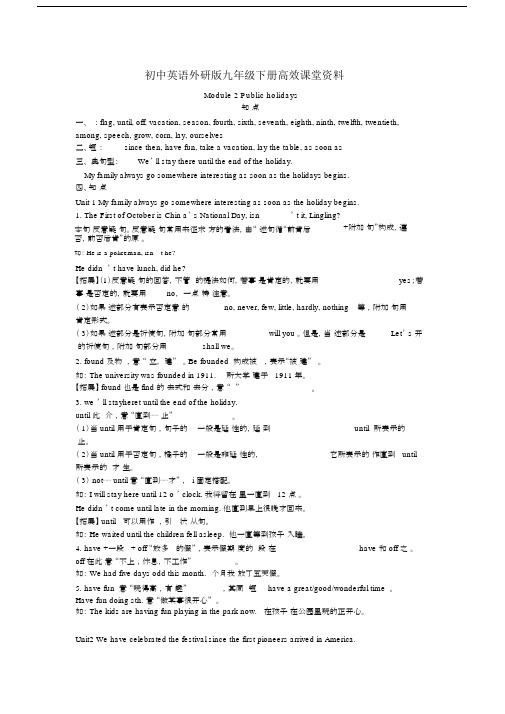
初中英语外研版九年级下册高效课堂资料Module 2 Public holidays知 点一、 : flag, until, off, vacation, season, fourth, sixth, seventh, eighth, ninth, twelfth, twentieth,among, speech, grow, corn, lay, ourselves 二、短 : since then, have fun, take a vacation, lay the table, as soon as三、 典句型: We ’ ll stay there until the end of the holiday.My family always go somewhere interesting as soon as the holidays begins.四、知 点Unit 1 My family always go somewhere interesting as soon as the holiday begins. 1. The First of October is Chin a ’ s National Day, isn’ t it, Lingling?+附加 句”构成,遵He didn ’ t have lunch, did he?【拓展】(1)反意疑 句的回答,不管 的提法如何,若事 是肯定的,就要用 yes ;若事 是否定的,就要用 no , 一点 特 注意。
( 2)如果 述部分有表示否定意 的no, never, few, little, hardly, nothing 等 ,附加 句用肯定形式。
( 3)如果 述部分是祈使句,附加 句部分常用 will you 。
但是,当 述部分是Let ’ s 开的祈使句 ,附加 句部分用shall we 。
2. found 及物 ,意 “ 立, 建” 。
Module 2课文知识点总结-外研版九年级下册英语
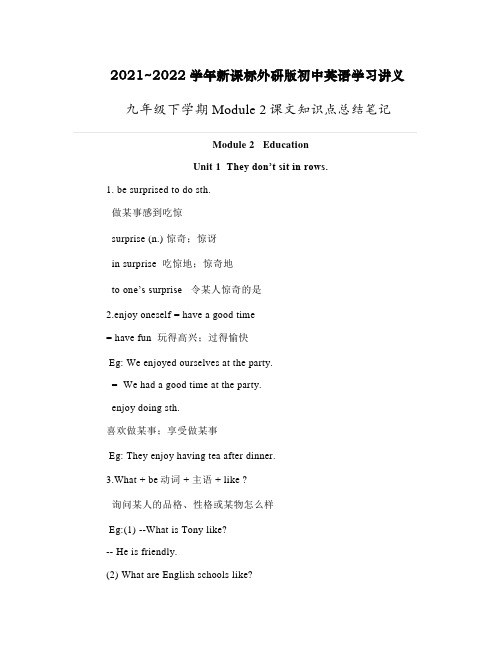
2021~2022学年新课标外研版初中英语学习讲义九年级下学期Module 2课文知识点总结笔记Module 2 EducationUnit 1 They don’t sit in rows.1. be surprised to do sth.做某事感到吃惊surprise (n.) 惊奇;惊讶in surprise 吃惊地;惊奇地to one’s surprise令某人惊奇的是2.enjoy oneself = have a good time= have fun 玩得高兴;过得愉快Eg: We enjoyed ourselves at the party.= We had a good time at the party.enjoy doing sth.喜欢做某事;享受做某事Eg: They enjoy having tea after dinner.3.What + be动词 + 主语 + like ?询问某人的品格、性格或某物怎么样Eg:(1) --What is Tony like?-- He is friendly.(2) What are English schools like?-- They are very big.What + do/ does + 主语 + look like?Eg: --What does Lily look like?-- She has big eyes and small mouth.4.take photos oneself 自拍5.let’s “让我们”后跟动词原形,let’s (not) do sth.“让我们(不)做某事”let’s包括说话人和听话人双方在内,含有催促、建议或请对方一起行动。
反义疑问句用shall we.let us表请求对方允许自己做某事,不包括听话人在内。
反义疑问句用will you.6.have a look at = look at 看一看7.a bit “一点儿”可修饰形容词比较级, much, far, even也可修饰形容词比较级。
初中英语外研版九年级下册高效课堂资料Module 1 Unit2(共16张PPT)
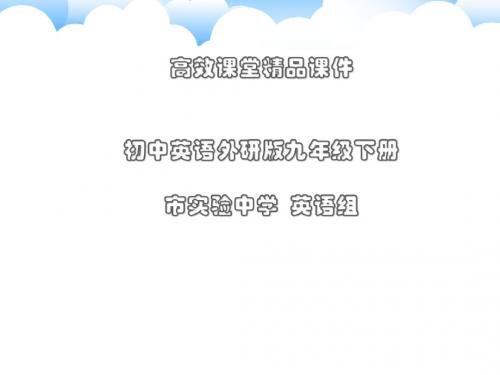
Li Lin
get on the train look for his seat sit in his seat take the wrong seat
elderly man
ticket officer
news advertisement
diary play
Must do Better do Team work write a short play about a trip you have made.
1. …gets up and starts to…
2. …looks for his ticket…
3. …goes past people…
4. … gets on the train…
1. Where are Li Lin and Li Wei? a) They are at home. b) They are at the railway station. c) They are on the train. d) They are in a car. 2. Who is Li Wei? a) She is Li Lin’s sister. b) She is Li Lin’s friend. c) He is Li Lin’s father. d) He is Li Lin’s classmate.
3. Why is the elderly man sitting in Li Lin’s seat? a) Because he did not buy a ticket. b) Because he is too tired to move. c) Because he thinks it is his seat. d) Because he cannot find his seat. 4. What does the elderly man want to do? a) Take the seat. b) Go and find Car 9. c) Change seats with Li Lin. d) Buy another ticket.
初中英语外研版九年级下册高效课堂资料Module 12 复习学案
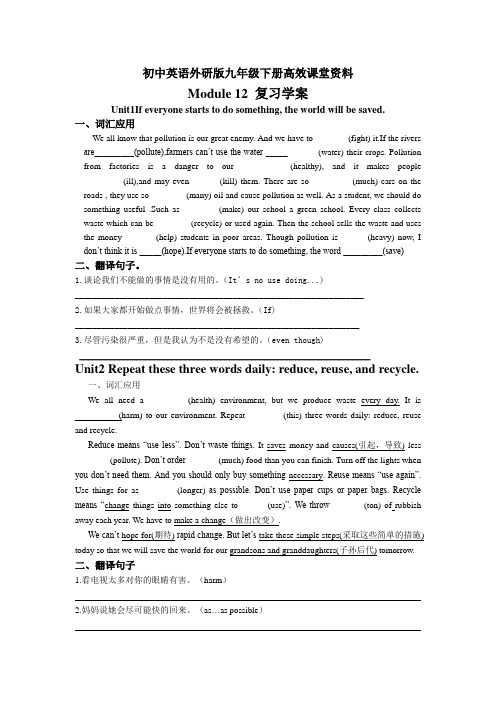
初中英语外研版九年级下册高效课堂资料Module 12 复习学案Unit1If everyone starts to do something, the world will be saved.一、词汇应用We all know that pollution is our great enemy. And we have to________(fight) it.If the rivers are_________(pollute),farmers can’t use the water ____________(water) their crops. Pollution from factories is a danger to our ___________(healthy), and it makes people _________(ill),and may even_______(kill) them. There are so__________(much) cars on the roads , they use so ________(many) oil and cause pollution as well. As a student, we should do something useful .Such as_________(make) our school a green school. Every class collects waste which can be ________(recycle) or used again. Then the school sells the waste and uses the money _______(help) students in poor areas. Though pollution is ______(heavy) now, I don’t think it is _____(hope).If everyone starts to do something, the word _________(save)二、翻译句子。
初中英语外研版九年级下册高效课堂资料G9BM1U2 PPT
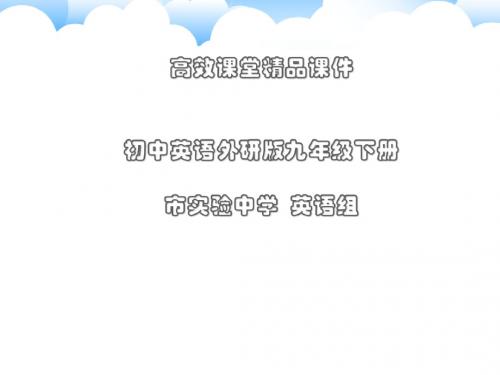
1. …gets up and starts to…
2. …looks for his ticket…
3. …goes past people…
4. … gets on the train…
1. Where are Li Lin and Li Wei? a) They are at home. b) They are at the railway station. c) They are on the train. d) They are in a car. 2. Who is Li Wei? a) She is Li Lin’s sister. b) She is Li Lin’s friend. c) He is Li Lin’s father. d) He is Li Lin’s classmate.
Li Lin
get on the train look for his seat sit in his seat take the wrong seat
elderly man
ticket officer
news advertisement
diary play
Must do Better do Team work write a short play about a trip you have made.
Module1 Journey
Unit 2 It's a long story
1. ...gets up and starts to,,,
2. ...looks for his tickets,,, 3. ...goes past people...on the train 4. ...gets on the train...
初中英语外研版九年级下册高效课堂资料m2 知识梳理
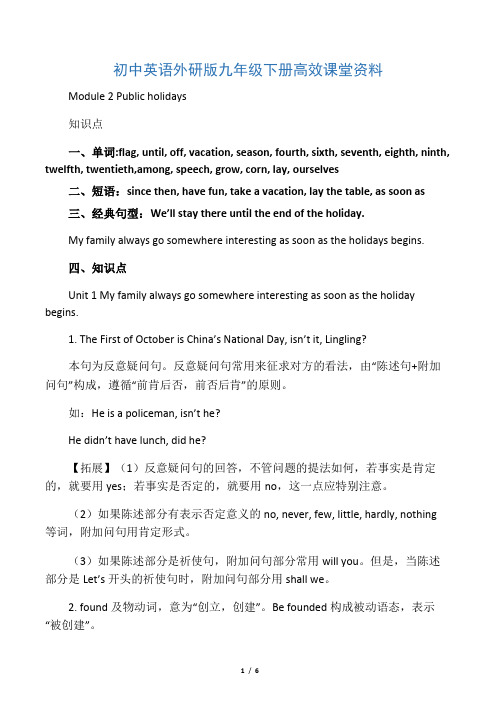
初中英语外研版九年级下册高效课堂资料Module 2 Public holidays知识点一、单词:flag, until, off, vacation, season, fourth, sixth, seventh, eighth, ninth, twelfth, twentieth,among, speech, grow, corn, lay, ourselves二、短语:since then, have fun, take a vacation, lay the table, as soon as三、经典句型:We’ll stay there until the end of the holiday.My family always go somewhere interesting as soon as the holidays begins.四、知识点Unit 1 My family always go somewhere interesting as soon as the holiday begins.1. The First of October is China’s National Day, isn’t it, Lingling?本句为反意疑问句。
反意疑问句常用来征求对方的看法,由“陈述句+附加问句”构成,遵循“前肯后否,前否后肯”的原则。
如:He is a policeman, isn’t he?He didn’t have lunch, did he?【拓展】(1)反意疑问句的回答,不管问题的提法如何,若事实是肯定的,就要用yes;若事实是否定的,就要用no,这一点应特别注意。
(2)如果陈述部分有表示否定意义的no, never, few, little, hardly, nothing等词,附加问句用肯定形式。
(3)如果陈述部分是祈使句,附加问句部分常用will you。
初中英语外研版九年级下册高效课堂资料知识点汇总
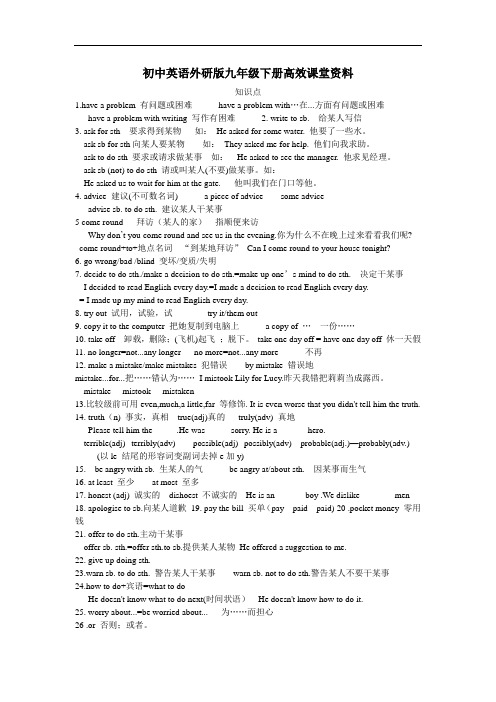
初中英语外研版九年级下册高效课堂资料知识点1.have a problem 有问题或困难have a problem with…在...方面有问题或困难have a problem with writing 写作有困难 2. write to sb. 给某人写信3. ask for sth 要求得到某物如:He asked for some water. 他要了一些水。
ask sb for sth向某人要某物如:They asked me for help. 他们向我求助。
ask to do sth 要求或请求做某事如:He asked to see the manager. 他求见经理。
ask sb (not) to do sth 请或叫某人(不要)做某事。
如:He asked us to wait for him at the gate. 他叫我们在门口等他。
4. advice 建议(不可数名词) a piece of advice some adviceadvise sb. to do sth. 建议某人干某事5 come round 拜访(某人的家)指顺便来访Why don’t you come round and see us in the evening.你为什么不在晚上过来看看我们呢? come round+to+地点名词“到某地拜访”Can I come round to your house tonight?6. go wrong/bad /blind 变坏/变质/失明7. decide to do sth./make a decision to do sth.=make up one’s mind to do sth. 决定干某事I decided to read English every day.=I made a decision to read English every day.= I made up my mind to read English every day.8. try out 试用,试验,试try it/them out9. copy it to the computer 把她复制到电脑上 a copy of …一份……10. take off 卸载,删除;(飞机)起飞;脱下。
新版外研社九年级英语下知识点Module2
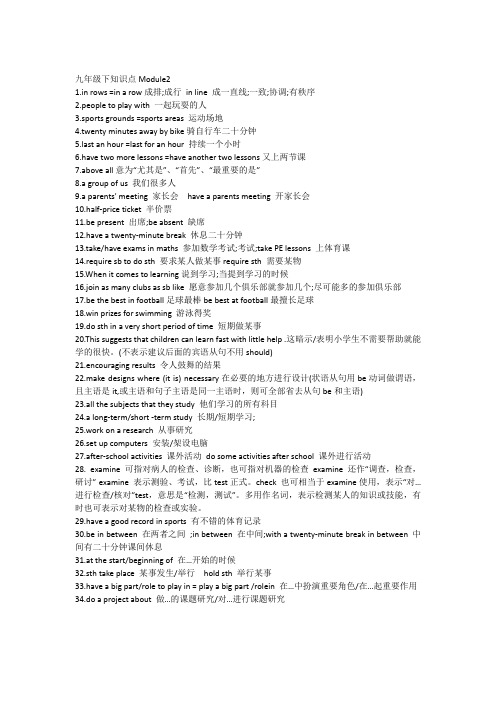
九年级下知识点Module21.in rows =in a row成排;成行in line 成一直线;一致;协调;有秩序2.people to play with 一起玩耍的人3.sports grounds =sports areas 运动场地4.twenty minutes away by bike骑自行车二十分钟st an hour =last for an hour 持续一个小时6.have two more lessons =have another two lessons又上两节课7.above all意为“尤其是”、“首先”、“最重要的是”8.a group of us 我们很多人9.a parents' meeting 家长会have a parents meeting 开家长会10.half-price ticket 半价票11.be present 出席;be absent 缺席12.have a twenty-minute break 休息二十分钟13.take/have exams in maths 参加数学考试;考试;take PE lessons 上体育课14.require sb to do sth 要求某人做某事require sth 需要某物15.When it comes to learning说到学习;当提到学习的时候16.join as many clubs as sb like 愿意参加几个俱乐部就参加几个;尽可能多的参加俱乐部17.be the best in football足球最棒be best at football最擅长足球18.win prizes for swimming 游泳得奖19.do sth in a very short period of time 短期做某事20.This suggests that children can learn fast with little help .这暗示/表明小学生不需要帮助就能学的很快。
初中英语外研版九年级下册高效课堂资料M1U2学案二
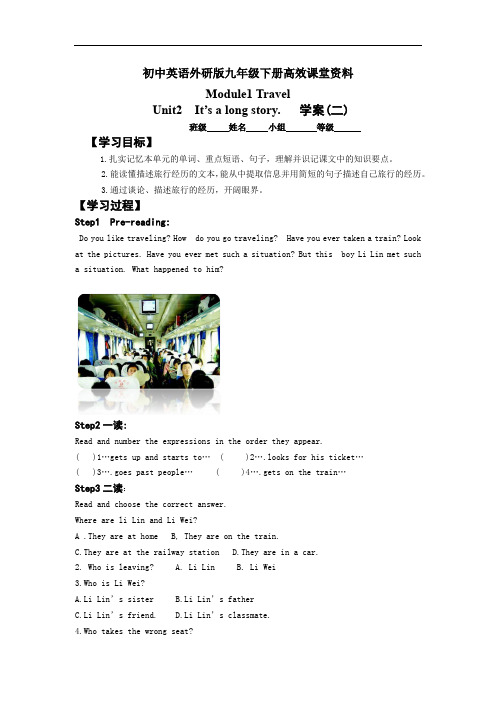
初中英语外研版九年级下册高效课堂资料Module1 TravelUnit2 It’s a long story. 学案(二)班级姓名小组等级【学习目标】1.扎实记忆本单元的单词、重点短语、句子,理解并识记课文中的知识要点。
2.能读懂描述旅行经历的文本,能从中提取信息并用简短的句子描述自己旅行的经历。
3.通过谈论、描述旅行的经历,开阔眼界。
【学习过程】Step1 Pre-reading:Do you like traveling? How do you go traveling? Have you ever taken a train? Look at the pictures. Have you ever met such a situation? But this boy Li Lin met such a situation. What happened to him?Step2一读:Read and number the expressions in the order they appear.( )1…gets up and starts to… ( )2….looks for his ticket…( )3….goes past people… ( )4….gets on the train…Step3二读:Read and choose the correct answer.Where are li Lin and Li Wei?A .They are at home B, They are on the train.C.They are at the railway stationD.They are in a car.2. Who is leaving? A. Li Lin B. Li Wei3.Who is Li Wei?A.Li Lin’s sisterB.Li Lin’s fatherC.Li Lin’s friend.D.Li Lin’s classmate.4.Who takes the wrong seat?A.Li LinB.the el derly manC.Wang Peng5.Which car should the elderly man be in? A.Car 7 B.Car 8 C. Car 9.6.What does the elderly man want to do?A. Take the seatB.Change seats with Li LinC. Go and find Car9D.Buy another ticket7.What does Li Lin decide to do?A.Take the seat from the elderly manB. Change seats with the elderly manC. Ask the ticket officer for helpD. Get off the train8.Who does Li Lin meet in Car9?A. Li WeiB. His friendC. Another elderly manD. His classmateStep4三读:Li Lin and Li Wei are on the station platform, saying goodbye to each other.本句中为什么用saying 这种形式?__________________.We’ll miss you too.(变否定句)___________________________.You’ve taken the wrong seat,________ ________?(反意疑问句)finally=__________ _______=______ ______ ______Please have your tickets ready.(翻译该句)I’ll have someone to talk to on the long journey. (把该句变成复合句)Step5 重点词组向……道别保重坐错座位寻找准备好某物我明白是什么问题了坐起来等一会儿坐你的座位穿过人群你真是太好了惊讶得做…见到你真是太棒了在站台上使你自己舒服。
- 1、下载文档前请自行甄别文档内容的完整性,平台不提供额外的编辑、内容补充、找答案等附加服务。
- 2、"仅部分预览"的文档,不可在线预览部分如存在完整性等问题,可反馈申请退款(可完整预览的文档不适用该条件!)。
- 3、如文档侵犯您的权益,请联系客服反馈,我们会尽快为您处理(人工客服工作时间:9:00-18:30)。
初中英语外研版九年级下册高效课堂资料
M12知识点
1. pollute及物动词,意为“污染”。
Pollution不可数名词,意为“污染”。
如:Don’t pollute the water.不要污染水。
Air pollution is a serious problem.空气污染是个严重的问题。
2. recycle可用作及物动词,又可用作不及物动词,意为“回收利用,循环使用”。
如:What things do you recycle?你们回收利用什么东西?
【拓展】recycling名词,意为“回收利用”。
如:Recycling is good for the environment.回收利用对环境有好处。
3. It’s no use talking about things we can’t do.讨论我们不能做的事情是没有用的。
It’s no use doing sth.意为“做某事是没有用的”。
如:It’s no use complaining about it.对此抱怨是没有用的。
4. That means less waste.那意味着更少的浪费。
Less此处用作形容词,意为“较少的”。
如:People should eat less fat.人们应该少摄入脂肪。
【拓展】less than意为“小于”,no less than意为“不少于,不小于”。
5. Do you take your own bag when shopping and not ask for a plastic bag?
(1)take此处用作及物动词,意为“带”。
如:You should take your ID card with you.
辨析:take, bring与fetch
①take意为“带、拿走”,把某物从说话者处拿到别处去。
如:Take the newspaper there.把报纸拿到那儿去。
②bring意为“带来”(表示“把某物从远处,别处拿到说话者跟前来”);
如:Bring the newspaper here.把报纸拿到这儿来。
③fetch意为“去取来”(表示“从说话者这儿出发去把别处的东西拿到说话者这儿来”)。
如:Fetch the newspaper for me.去把报纸替我拿来。
(2)ask for意为“请求,要求”。
如:The workers are asking for an increase in pay.工人们在要求增加工资。
【拓展】ask sb. for sth.意为“要求某人做某事;向某人要某物”。
如:We often ask the teacher for some advice.我们经常问老师些建议。
6. And what do you do with the bottles when they are empty? do with意为“处理,处置”。
如:What should I do with this old computer?我应该怎么处理这台旧电脑?
辨析:do with与deal with 二者均意为“处理,处置”,但do with与what连用,deal with 与how连用。
7. be good for对……有好处
如:Reading more books is good for us.多读书对我们有好处。
Eating more vegetables is good for your health.多吃蔬菜对你的健康有好处。
【拓展】(1)be good at意为“擅长”。
如:She is good at playing basketball.他擅长打篮球。
(2)be good to意为“对……友好”。
如:My friend is good to me.我的朋友对我很友好。
五、链接中考
翻译句子
1.吃太多盐对我们的健康不利。
(no good for)2015潍坊中考
答案:(Eating) Too much salt is no good for our health.
2.我们需要采取一些措施来减少污染。
(take steps)2017潍坊中考答案:We need to take some steps to reduce pollution.。
